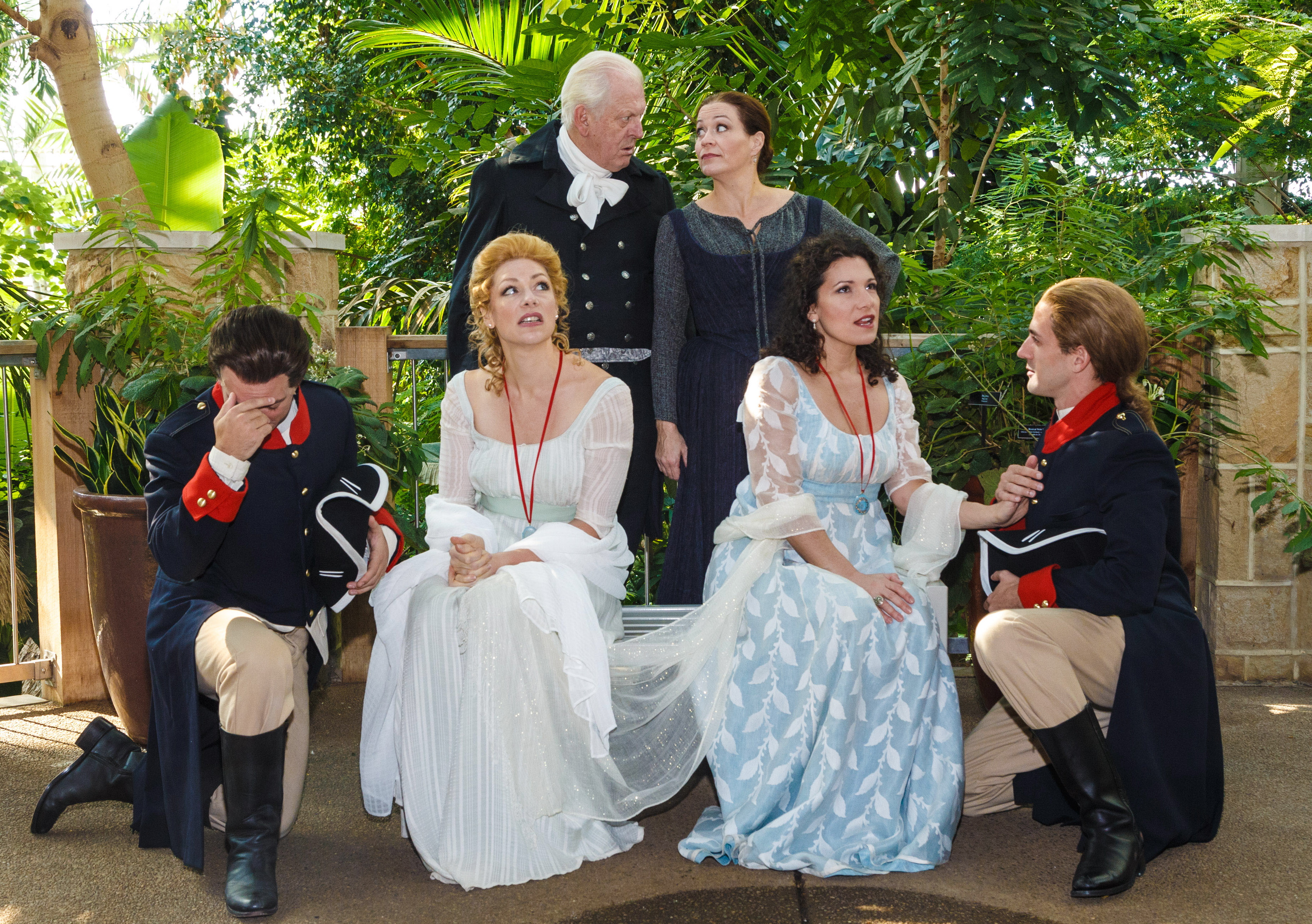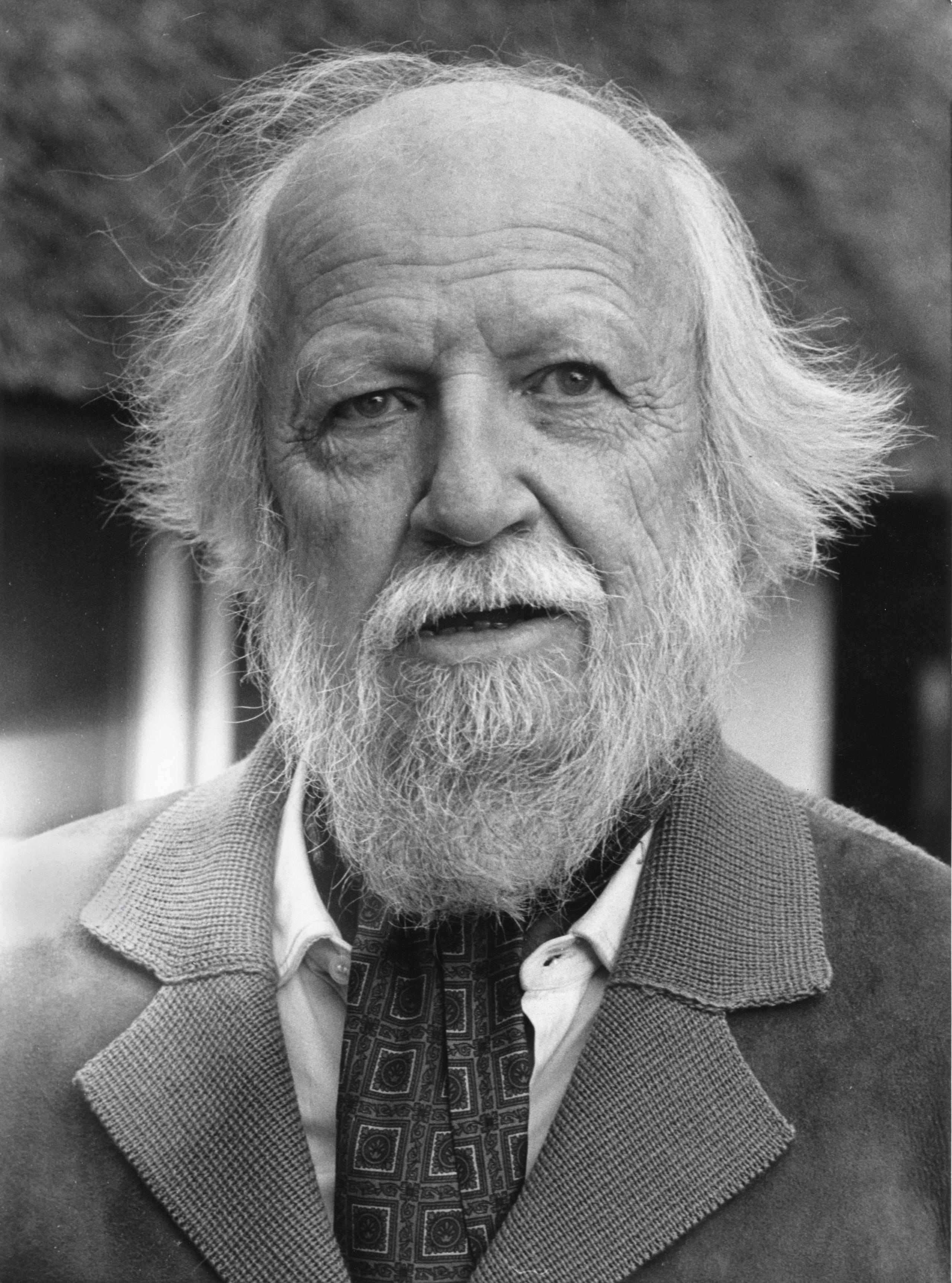November Theater Preview: Even the Old Stuff Is New

Hmm… hmm… so many new plays. What shall we see? Actually these are lead cast members in an old classic, Mozart’s “Cosi fan tutte” at Pittsburgh Opera. Front, L to R: Christopher Tiesi, Jennifer Holloway, Danielle Pastin, Hadleigh Adams. Standing: Sir Thomas Allen and Sari Gruber.
What’s new on the Pittsburgh theater schedule for November? So much that one hardly knows where to start. You could make it an entire month of seeing shows that most Pittsburghers have never seen.
Sunset Baby (at City Theatre), Good Kids (Pitt Theatre Arts), and Small Engine Repair (barebones productions), which have premiered elsewhere within the past couple of years and been hailed as edgy and provocative, are being given their first productions here.
Quantum Theatre’s Chickens in the Yard is a world premiere, a Pittsburgh original created by Hatch Arts Collective. The major touring musicals in November are A Gentleman’s Guide to Love and Murder, the 2014 Tony winner, and Mystic India—The World Tour, a big Bollywood revue currently making its maiden voyage.
Even the old classics on tap include two seldom-seens: Carlo Goldoni’s A Servant to Two Masters (a.k.a Servant of Two Masters) and the stage version of Lord of the Flies.
Finally, in an ironic twist, some theater fans are said to be bored by novelty. They need not despair. Various companies are staging reliably great standards, including Ibsen’s The Wild Duck, August Wilson’s The Piano Lesson, and Mozart’s comic opera Cosi fan tutte. Shows are previewed in order of their run dates.
THE CRUCIBLE by Arthur Miller. Through Nov. 8, Prime Stage Theatre.
Prime Stage Theatre kicks off its season with the witch play in which witches aren’t the scary part. Arthur Miller’s The Crucible is about the Salem witch trials of 1692-93 that sent 20 innocent people to their deaths. The Crucible shouldn’t be taken as a precise historical account of the trials. Miller invented scenes and dialogue to help move the story along, and he altered some key facts regarding certain people and their roles in the events. Yet it’s true that such figures as John Proctor (the central character) were hanged on the basis of “evidence” that seems absurd today—and even seemed absurd to many horrified onlookers of the time. Miller was moved to write the play by the inquests into suspected Communist activity in the United States during the early 1950s; The Crucible won the Tony Award for Best Play in 1953. At the New Hazlett Theater, 6 Allegheny Square East, North Side.
A SERVANT TO TWO MASTERS by Carlo Goldoni, adapted by Lee Hall. Nov. 5 – Dec. 6, Pittsburgh Public Theater.
Although the name of the genre sounds highbrow, commedia dell’arte is a form of comic theater that features wacky physical humor, lots of joking about sex and body parts, and the relentless jagging of pomposity, social conventions, etc. Very popular in Italy and elsewhere from the 1500s through the 1700s, commedia dell’arte is performed today mainly as a small-audience cult attraction, not in major revivals. There’s little to work from in the way of old scripts because the creators of the form were early improv artists, creating entire shows around a set of stock characters they’d invented. But a commedia-inspired play from the mid-1700s has survived that captures the flavor of this kind of comedy: Carlo Goldoni’s Servant of Two Masters. The play was staged hilariously at Carnegie Mellon a few years ago, and now Pittsburgh Public Theater is taking it on. The Public’s version, titled A Servant to Two Masters, was translated and adapted by the English dramatist Lee Hall. As in Goldoni’s original, the action revolves around the servant Truffaldino as he tries to satisfy not only two employers but also two appetites, his lust for food and for you-know-what else. At the O’Reilly Theater, 621 Penn Ave., Cultural District.
AAKASH ODEDRA COMPANY (modern dance). Nov. 6 only, presented by Pittsburgh Dance Council.
Over the years, Pittsburgh Dance Council has brought many of the world’s best modern dance companies to town. Next up is the entrancing and enigmatic solo artist Aakash Odedra, who bills himself as Aakash Odedra Company, though he’s usually the only one dancing. Born and still living in England, Odedra mixes classical Indian dance with his own inventive choreography and eerie stage effects. But he also works collaboratively. In Pittsburgh he will perform Rising (see video excerpts above), a feature-length show made up of four shorter pieces created for him by other choreographers. The performance is part of the Cultural Trust’s India in Focus series. Byham Theater, 101 6th St., Cultural District.
THE WILD DUCK by Henrik Ibsen. Nov. 6-22, Point Park University Conservatory Theatre.
Shall we compare the plays of Henrik Ibsen to chocolate brownies? They are dark and rich, and so good that once you try one, you want more. Just keep in mind that the Norwegian master differs from the popular dessert in that he does not provide happy endings. The Wild Duck, which is being presented by Point Park’s Conservatory Theatre, has one of the grimmest and most shocking. The story leading up to that end has some elements similar to Ibsen’s Ghosts: A prominent man turns out to have behaved badly in the past, and the secret of his affair with a household servant hovers darkly over the present. But in The Wild Duck, the resulting tensions and conflicts play out much differently, with a core question being whether the truth should be revealed to someone who maybe doesn’t need to know. There is actually a duck in the story, and death, and it isn’t the duck’s. Studio Theatre at Pittsburgh Playhouse, 222 Craft Ave., Oakland.
COSÌ FAN TUTTE (opera) by Wolfgang Amadeus Mozart. Nov. 7-15, Pittsburgh Opera.
Put into casual modern English, the title of Mozart’s Così fan tutte would be something like “That’s what they all do,” meaning women of course. But the men are the real cads in this comic opera that has become a fan favorite. The plot in a nutshell: Two soldiers agree to test the faithfulness of their fiancées by pretending to go off to war, then coming back in disguise so each can try to seduce the other’s betrothed. After many twists, everyone ends up happy, with plenty of laughs and good music along the way. The opera was formerly considered so risqué that for long periods and in many places it was withheld from the repertoire or presented only in sanitized form. Pittsburgh Opera is performing Così fan tutte as Mozart intended, with the memorable scenes and singing intact … because nowadays, that’s what they all do. Benedum Center, 237 7th Ave., Cultural District.
SUNSET BABY by Dominique Morisseau. Nov. 7 – Dec. 13, City Theatre.
To get in the mood for Sunset Baby, try listening to Gil Scott-Heron’s 1970 anthem “The Revolution Will Not Be Televised.” As it turned out, many aspects of that era’s black liberation movement were in fact televised, media-analyzed, and, ultimately, marginalized. Dominique Morisseau’s 2013 play explores the failures and unfinished business that have resulted. Set in the present, Sunset Baby concerns a former activist who pays a visit to the now-grown daughter he once abandoned. She’s living a low life that appalls him; he tries to preach the ideology that had inspired him; she lashes back. Amid the fireworks, the play digs into the personal issues that can’t be separated from social issues—specifically, those arising between a parent and child, both of whom are flawed, as we humans tend to be. City Theatre is presenting Sunset Baby in the Hamburg Studio Theatre adjacent to 1300 Bingham St., South Side.
MYSTIC INDIA—THE WORLD TOUR (Bollywood musical special) created and directed by Amit Shah. Nov. 8 only, international touring company at Byham Theater.
Here comes a really big show for lovers of Bollywood song and dance. Mystic India—The World Tour is a musical stage extravaganza that sets out to present a tour of India itself, past and present. That’s a tall order, given that India is a large, complex country with about four times the population of the United States,10 times the U.S.’s recorded history, and correspondingly more of everything else. But as countless movies and music videos richly attest, if any entertainment industry is up to the job, it’s the one based in Mumbai. The Bollywood aesthetic thrives on “more of everything”!!!! Mystic India has waves of mass musical numbers paying tribute to various regions and cultures. It has a live narrator to help explain scenes depicting the life of Mahatma Gandhi and India’s annual Holi festival. It has acrobats performing mallakhamba, a jaw-dropping style of Indian gymnastics, and special effects reflecting the Bollywood belief that there’s no such thing as a cheap trick as long as it is done extravagantly. The Mystic India touring company visits Pittsburgh as part of the Cultural Trust’s India in Focus series. 7 p.m. Byham Theater, 101 6th Ave., Cultural District.
GOOD KIDS by Naomi Iizuka. Nov. 11-22, University of Pittsburgh Dept. of Theatre Arts.
It’s a long way from ancient Greece to Steubenville, Ohio, but that is where Naomi Iizuka’s artistic journey has led. Iizuka, a California-based playwright, has written about teenagers in modern American society by using themes from Greek myth. Her play Anon(ymous) is based on Homer’s Odyssey, except the hero is a young refugee from a war-torn country adrift in the United States. And in Polaroid Stories, such mythical figures as Orpheus, Eurydice, and Narcissus are re-imagined as homeless teens in a big city where the only grownup who cares about them is the drug dealer and the wine god Dionysus. Good Kids, Iizuka’s new play, does not rely so heavily on mythology. Its story is drawn from unhappy true events of recent times: the Steubenville High School rape incident, the social-media frenzy that followed, and similar cases in the news. When Good Kids premiered last year at the University of Michigan, a new tradition was set. Audience members were told to leave their cell phones on. This feeds the disorienting experience of the play, which you can tweet about if you see Good Kids done by Pitt’s Department of Theatre Arts. Heymann Theatre in the Stephen Foster Memorial, 4301 Forbes Ave., Oakland.
THE PIANO LESSON by August Wilson. Nov. 13-21, Pittsburgh Playwrights Theatre Co. and Pittsburgh Cultural Trust.
August Wilson’s The Piano Lesson portrays a “lesson” that has nothing to do with keyboard technique. A woman living in Pittsburgh’s Hill District in the 1930s is keeper of the family’s heirloom piano, which is also a symbol of emergence from slavery—it once belonged to the Southerners who owned her ancestors. The woman’s brother wants to sell the piano to buy and farm the land where those ancestors once worked as slaves. A complex struggle develops over the piano, and it’s really the reflection of a more important struggle: the search for ways to deal with the past and build a future. The Piano Lesson won the 1990 Pulitzer Prize for Drama. Pittsburgh Playwrights Theatre Company performs the play at the August Wilson Center, 930 Liberty Ave., Cultural District.
A GENTLEMAN’S GUIDE TO LOVE AND MURDER (musical) by Robert L. Freedman and Steven Lutvak. Nov. 17-22, national touring company at Benedum Center.
When A Gentleman’s Guide to Love and Murder won last year’s Tony Award for Best Musical, it wasn’t the first time the underlying story has been made into a hit. Aficionados of old movies will recall the 1949 comedy Kind Hearts and Coronets, with Alec Guinness playing eight roles and getting bumped off in most of them. That movie and the modern musical are derived from the same obscure novel, Israel Rank: Autobiography of a Criminal—but while literary genealogy can be fun, the offspring are funnier. A Gentleman’s Guide has been pronounced seriously humorous. It’s about a distant relative of an English earl who plots to ascend to the earldom by eliminating the closer kin. Over the course of his quest, he pretends to be gay (“It’s Better with a Man”), dispatches people with weapons ranging from a barbell to a swarm of bees, and much more. Please don’t try any of this at home; just watch the national touring company act it out. Benedum Center, 237 7th Ave., Cultural District.
SMALL ENGINE REPAIR by John Pollono. Nov. 19 – Dec. 6, barebones productions.
John Pollono’s Small Engine Repair is a black-comedy, blue-collar suspense play. If you Google “small engine repair” you will get a list of shops that fix lawn mowers, snow blowers, etc., and that kind of shop is the play’s setting. The owner, a guy named Frank, has invited two old buddies (who don’t particularly like one another) to come over one night for a boozy sort of mini-reunion. He’s also invited a preppy college type to bring Ecstasy. This seems like a recipe for more than enough trouble—but wait, Frank has a hidden agenda. Small Engine Repair has gotten strong positive reviews in Los Angeles and off-Broadway. Barebones productions is performing the play at a fitting blue-collar venue, the company’s black-box space near the Edgar Thomson Steel Works. 1211 Braddock Ave., Braddock.

William Golding had firsthand knowledge of civil societies turned violent: He served in the Royal Navy in ferocious battles of World War II.
LORD OF THE FLIES adapted from William Golding’s novel by Nigel Williams. Nov. 19 – Dec. 5, Carnegie Mellon School of Drama.
Golding’s Lord of the Flies is one of those novels you read during your school days and think you’ll never forget, but as time goes by, the grisly details fade. Now comes a rare chance to see it all brought back. Carnegie Mellon’s School of Drama is performing the 1995 stage adaptation by Nigel Williams, which is highly regarded in the United Kingdom (where a major new production is currently on tour), though few Americans even know that a theatrical version exists.
For the uninitiated: Lord of the Flies is a fictional story about English schoolboys stranded on a remote island. They’re bright young fellows who promptly organize to do what’s needed—forage for food, build shelters, get along together—until dissension and irrational fears turn their civil society into a bloodbath. Philip Chosky Theater in the Purnell Center for the Arts at Carnegie Mellon, 5000 Forbes Ave., Oakland.
CHICKENS IN THE YARD by the Hatch Arts Collective. Nov. 20 – Dec. 6, Quantum Theatre.
Rule of thumb for enjoying a typical Quantum Theatre season: Do not bother to ask or even wonder what the next play is “about.” The value proposition is that it will be something that surprises you and can’t easily be explained in advance. Maybe an experimental work you haven’t heard of, or a play you’ve heard of but never imagined done the Quantum way, or something entirely new and bizarre. Chickens in the Yard is the last kind. The promo material that Quantum must put out to fill the maw of the mainstream media does attempt an explanation and description, because the maw expects these. A recent blurb mentions that Chickens in the Yard was created for Quantum by a Pittsburgh group called the Hatch Arts Collective; it deals with gay identity, and it’s funny. To borrow from the closing line of John Keats’ “Ode on a Grecian Urn,” that is all ye need to know. At Javo Studios, 5137 Holmes St., Lawrenceville.
Photo credits: Pittsburgh Opera cast by David Bachman Photography. Karla C. Payne, courtesy of Pittsburgh Playwrights. William Golding, photographer unknown, courtesy of Dutch National Archives via Creative Commons ShareAlike license 3.0.
Mike Vargo, a Pittsburgh-based freelance writer and editor, covers theater for Entertainment Central.
Share on Social Media
Follow Entertainment Central
Latest Stories
Sign up for the EC Newsletter








